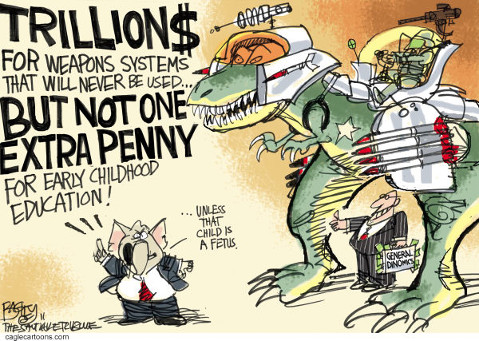Swimming Upstream in the D.C. Swamp
A Fight for Education in the Halls of Congress

As the president prepared for his 100th day of mischief and the U.S. House and Senate edged toward government shutdown in late April, I joined dozens of other higher education leaders to advocate for grant funding and legislation to protect DACA recipients, DREAMers covered under Obama’s Executive Order.
Arriving in D.C. late the night of the March for Science, as I neared the Capitol, I saw fences lined with march signs — the aftermath of a modern battle. I geared up for my own fight.
I was there to chair a meeting of the governing board of the Hispanic Association of Colleges and Universities at our annual forum. We heard from congressmembers, policy institutes, and accreditation bodies about the deep cuts facing higher education. Departments of Defense and Homeland Security receive over half of all discretionary spending, while Education receives only 6 percent.
The political frenzy du jour was that Trump announced he wouldn’t sign a budget if it didn’t include funding for “The Wall.” The Trump budget plan already axed TRIO programs such as Upward Bound that promote student success. It reduces funding for work-study, cuts Student Equal Opportunity Grants, and was slated to take back over $3 billion in Pell Grant funding. A forced government shutdown would result in even deeper cuts for education.
So, we took our case to Congress.
It was pouring rain. We waited in long lines to get through security at the Capitol, surrounded by teachers, parents with special needs kids, nurses, scientists — all of us there to make our voices heard.
Two limos pulled up to the side of the building and men in four-figure suits were ushered in through a private entrance — no waiting in the rain. Who were these people? Big pharma? Defense contractors?
We eventually made it inside, and I later ran into the Expensive Suits. Subtle cues told me they were likely military contractor lobbyists, and I’ll leave it at that.
Congressmember Salud Carbajal joined us with a warm pledge of support from Santa Barbara. He spoke of being an immigrant who came here seeking a better life, of the DREAM Act [Development, Relief, and Education for Alien Minors] and DACA [Deferred Action for Childhood Arrivals]. He urged us to meet with congressmembers in our districts and “take DREAMers with you, so they can hear their stories.”
Senator Richard Durbin, who calls the DREAM Act the “most successful unsuccessful legislation in history,” is leading, together with the Hispanic Association of Colleges and Universities, an effort to extend DACA through bipartisan legislation called the BRIDGE Act [Bar Removal of Individuals Who Dream of Growing Our Economy]. “Now we have to make sure these kids don’t get deported,” he said.
Durbin told the story of one young Asian high school student who had been admitted to the Manhattan School of Music, but she was undocumented and couldn’t attend. She became one of many poster children for the DREAM Act. Because of DACA, they were able to attend college and earned work permits.
There are now 5 million Latinos in college, making Hispanics the fastest growing segment of college students. Among colleges and universities in the U.S., 472 meet the requirements of 25 percent Hispanic undergraduate enrollment to be classified as a federally designated Hispanic Serving Institution.
Antioch University Santa Barbara, where I serve as Provost/CEO, is one of those institutions. So are UC Santa Barbara and Santa Barbara City College. When I moved here from Houston, one of the reasons was that Santa Barbara is a community that values empowering its residents. To me, this means not alienating our DREAMers.
Minority Leader Nancy Pelosi’s staff told us she supported all of our issues. We even met with Senator Ted Cruz. Before we entered, the same expensive suit crew vacated his office. Cruz gave us 10 minutes and told us even he supports Pell Grants.
Trump later announced he was pulling back on “The Wall” ultimatum. However, Trump did land $1.5 billion for border security and $12.5 billion for defense.
In the end, we won back Pell Grant funding that will help more students earn college degrees. But this is just Round One. The stakes are high, so make those calls and visit your congressmember or senator. As for those of us who waited in the rain, you can bet we’ll be back with more in tow and better umbrellas.
Dr. William Flores currently serves Antioch University Santa Barbara and the national Hispanic Association of Colleges and Universities, and is past president of the University of Houston-Downtown and former Deputy Secretary for Higher Education in New Mexico.



